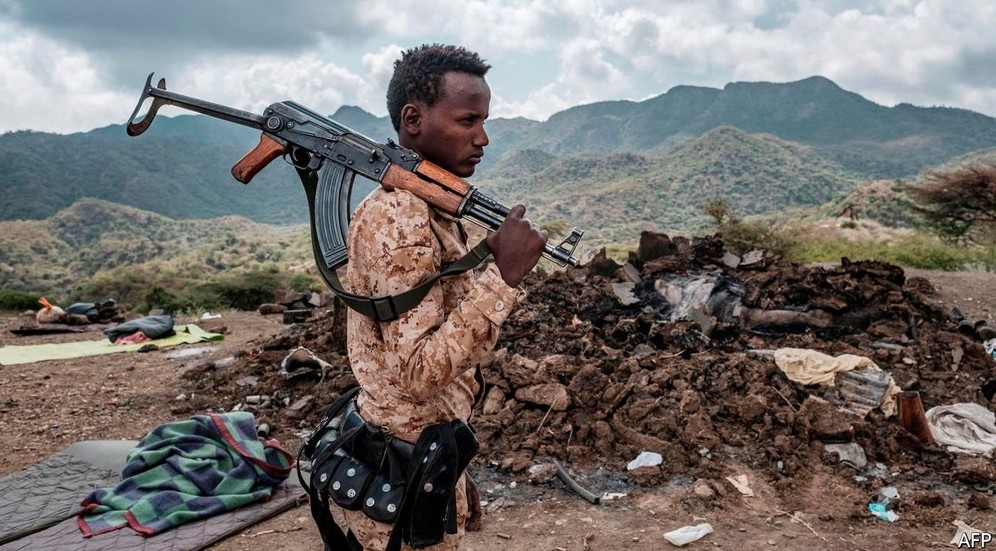Biniam Bedasso
The civil war in northern Ethiopia has entered its 11th month. The conflict, which started in the Tigray region, has expanded to the neighbouring regions of Amhara and Afar. More than two million people have been displaced and the destruction of civilian infrastructure has been significant. Humanitarian agencies warn that hundreds of thousands of people are on the verge of starvation. Allegations of mass atrocities abound.
As with most civil wars, women and children are bearing the brunt of the effects. The burden is particularly heavy on schoolchildren in the conflict zone and surrounding areas, who already have suffered significant learning losses due to restrictions caused by the COVID-19 pandemic. Authorities claim that more than 7,000 schools have been destroyed or damaged by the fighting, which could keep more than 1.4 million students out of classrooms in the upcoming academic year. The United Nations reports that aid agencies have been able to reach only 4% of girls and boys in need of emergency assistance in education. And because the state often relies on teachers throughout the country to carry out other kinds of civic duties, the mobilisation for war might affect education in other regions.
The war effort also could divert budgetary resources from sectors like education as defense spending grows. In the budget for the 2021-22 fiscal, the share of defense spending has increased by 0.5 percentage points, which is equivalent to a one-third increase in the nominal value of military expenditure, while the share of education spending has declined by 0.2 percentage points. Even if the government attempts to protect education spending, teachers – who already struggle with their relatively low public-sector salaries – could be hit hard by soaring inflation, which has reached 30% as a result of deficit financing and supply-side problems. This inevitably will demoralise and demotivate the country’s teachers.
Empirical evidence from countries around the world shows the substantial negative effects of exposure to conflict on educational attainment and literacy. Conflict also is likely to aggravate existing inequities, such as gender gaps in educational disparities. Ultimately, all of this feeds a vicious circle in which the lack of education and economic opportunities, compounded by lingering animosity, sustains conflict over multiple generations.
The parts of Ethiopia that are embroiled in the current conflict have endured decades of civil and inter-state wars. A study of the impact of the Ethiopian-Eritrean war on childhood health and education shows that the combination of school disruptions and poor nutrition significantly affected the educational outcomes of children in the affected areas. Sadly, many adults whose own childhood and education were marred by the civil war in the 1980s are seeing their children go through the same ordeal three decades later.
Despite the setbacks, Ethiopia can be commended for increasing access to primary education, which has compensated for some of the losses caused by the last civil war. Unfortunately, the current war broke out at an inopportune moment for many schools, which, in addition to the structural challenge of improving the overall quality of instruction, already faced the hard work of recovering from the pandemic’s effects on children’s education.
One way to limit the long-term consequences of conflict is to invest in protecting the education systems in affected and vulnerable communities. Such work must extend into the post-conflict and reconstruction period to prevent scores of children from falling through the cracks. In Ethiopia, the international community should match its effort to deliver lifesaving food aid to areas affected by war with targeted interventions to preserve the educational opportunities of children in the conflict zone.
Development organisations may find it challenging to balance support for interventions in education with efforts to leverage foreign aid as an incentive to negotiate an end to the conflict. But in the aftermath of the violent crackdown following the disputed elections in 2005, donors managed to continue funding the delivery of essential services through decentralised channels without giving a blank check to the government in the form of direct budget support. While every effort to bring this war to an end will pay dividends in terms of restoring the lives and educational opportunities of children, economic sanctions may be counterproductive if they result in diversion of resources away from schools or reduction of teachers’ real income through inflation.
More fundamentally, all sides in this war should be reminded that the human toll of the conflict is not limited to actual body counts or the number of people driven to starvation. The overall impact of the current fighting could extend to future generations, because millions of children are being denied their right to education. Politicians should be held accountable for that, too.
The writer is a senior research associate at the Center for Global Development in London. ©Project Syndicate
